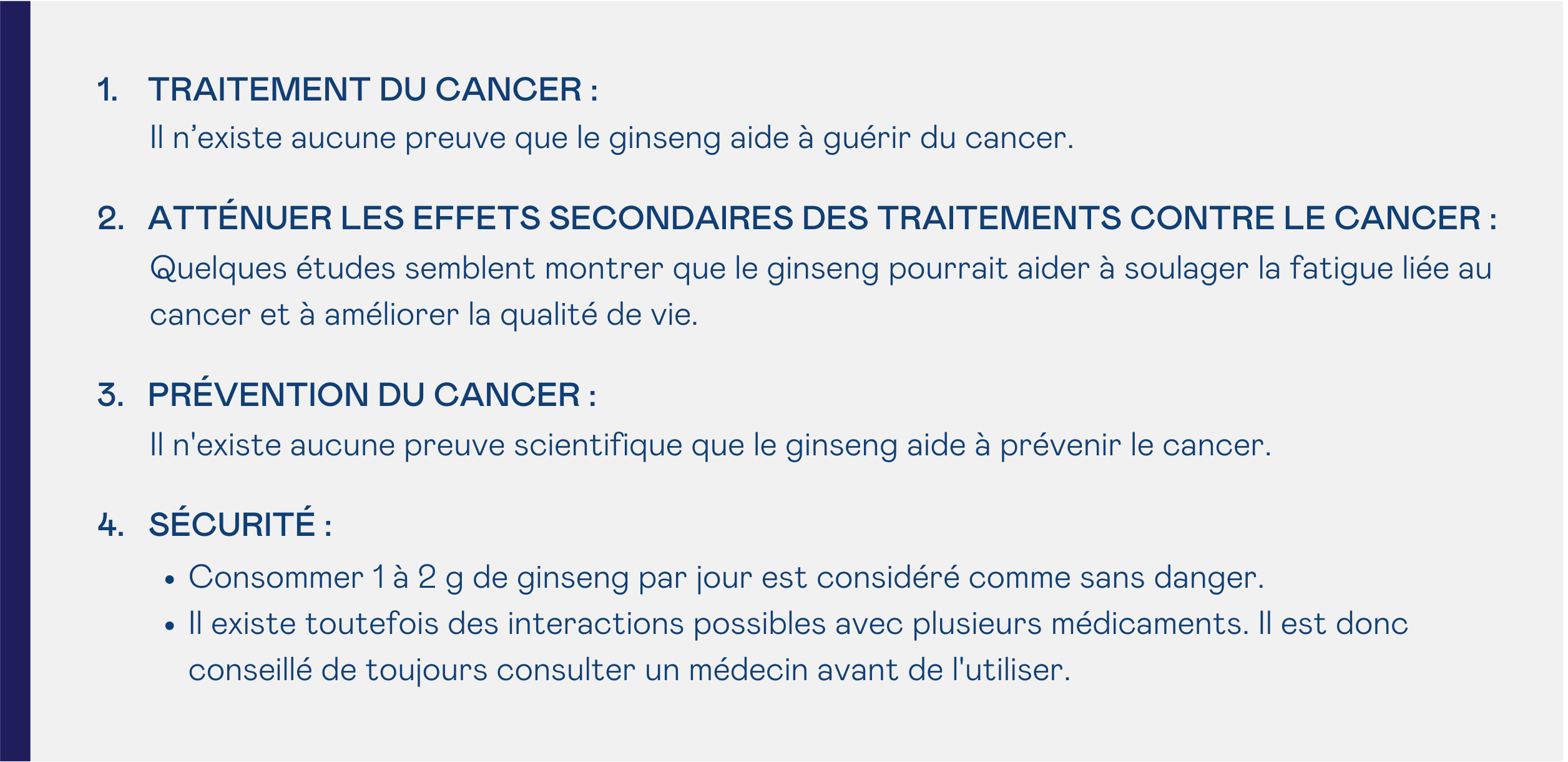Menu


Le terme ginseng est utilisé pour désigner plusieurs plantes, dont le ginseng asiatique (Panax ginseng) et le ginseng américain (Panax quinquefolius) (1).
Les composants actifs du ginseng sont les ginsénosides. Ils sont présents dans l’ensemble de la plante mais c’est principalement la racine qui est exploitée. Cette racine est séchée puis transformée en poudre concentrée, en liquide ou en comprimés. La médecine traditionnelle chinoise considère le ginseng comme un élément « yang ». Elle l’utilise en raison de ses propriétés médicinales et tonifiantes (1).
Chaque espèce de ginseng possède des caractéristiques typiques, mais dans la médecine traditionnelle chinoise, le ginseng est principalement utilisé pour renforcer ou revitaliser les patients affaiblis et fatigués, ou pour améliorer les performances et la concentration (1-3).
L’utilisation du ginseng pour les problèmes d’érection, le diabète et l’immunité ne repose également pas sur des preuves scientifiques solides (4-9).
La plupart des études examinent l’effet du ginseng sur les symptômes liés au cancer, tels que la fatigue. Cependant, il existe des différences importantes entre les études, notamment en ce qui concerne :
Ces disparités compliquent la formulation de conclusions claires et sans équivoques.
Il n’existe actuellement pas suffisamment de preuves pour affirmer que le ginseng puisse guérir le cancer.
Des données épidémiologiques concernant des patients atteints d’un cancer du sein montrent une amélioration de la survie grâce à la consommation de ginseng (10) et une réduction du risque de cancer de l’endomètre chez les survivantes d’un cancer du sein (11). Toutefois, ces observations restent très limitées et ne fournissent donc aucune preuve. Des études supplémentaires plus fiables et de plus grandes envergures doivent encore être menées pour pouvoir infirmer ou confirmer les résultats.
Selon un nombre limité d’études, le ginseng pourrait atténuer les effets secondaires du cancer et des traitements anticancéreux, tels que la fatigue. Il pourrait participer à améliorer la qualité de vie des patients. La plupart de ces études étant de faible qualité, des recherches supplémentaires sont nécessaires pour confirmer ces effets.
À ce jour, il n’existe aucune étude bien conçue examinant l’efficacité du ginseng dans la prévention du cancer. Deux publications suggèrent un lien positif entre l’utilisation de ginseng et la réduction du nombre de nouveaux cas de cancer, mais elles présentent une qualité médiocre (19, 20). Par conséquent, des études cliniques supplémentaires sont nécessaires pour confirmer ces effets.
1 à 2 g de ginseng séché par jour sont considérés comme sûrs.
Les effets secondaires possibles du ginseng sont les suivants :
Le ginseng pourrait augmenter la toxicité hépatique (toxicité hépatique) de l’Imatinib (22), mais cela nécessite des recherches supplémentaires dans le cadre d’études bien conçues.
Il existe des interactions possibles avec plusieurs médicaments. Il faut donc toujours consulter un médecin avant de l’utiliser.

Des professionnels pour répondre à toutes vos questions sur le cancer

